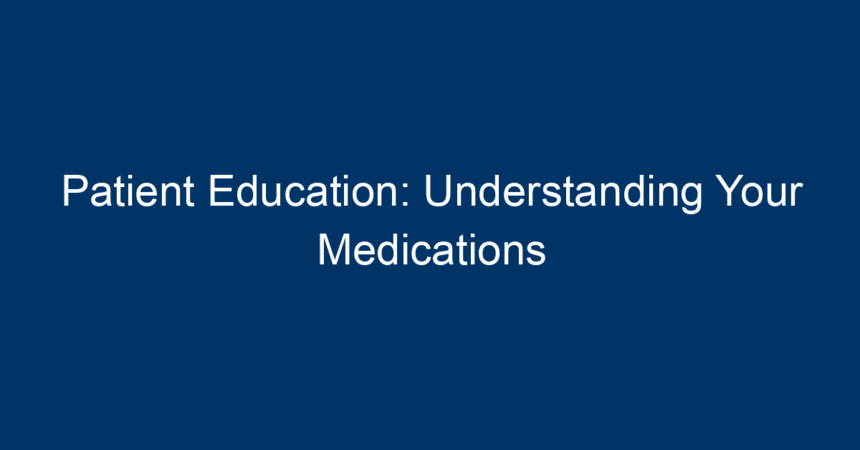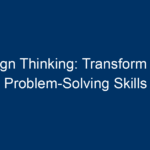In today’s healthcare landscape, the importance of patient education cannot be overstated, especially when it comes to medications. With the complexity and variety of treatments available, understanding your medications is crucial not just for your health but also for your overall well-being. This article will explore the importance of patient education regarding medications, outline key concepts, and provide actionable insights for empowering you, the patient, in your healthcare journey.
Why Patient Education Matters
Patient education is the backbone of effective healthcare management. When patients understand their medications, they can make informed decisions, discuss options with healthcare providers, and adhere to treatment plans. The benefits of patient education include:
-
Improved Medication Adherence: Knowledge about why and how to take medications can lead to better adherence. Understanding potential side effects and interactions can motivate patients to stick to their regimen.
-
Enhanced Safety: With proper education, patients can recognize adverse effects and avoid harmful drug interactions, thus becoming their own health advocates.
-
Empowered Decision-Making: An informed patient is better equipped to engage in conversations with healthcare professionals, leading to tailored treatment plans.
- Cost Savings: Understanding medications can prevent unnecessary medications or treatments, reducing healthcare costs over time.
Types of Medications You Might Encounter
In the world of healthcare, there are various classes of medications that patients may be prescribed. Understanding these can help you engage in effective patient education.
Prescription Medications
These are drugs prescribed by healthcare professionals to manage specific conditions. Common examples include:
- Antibiotics: Used to treat infections.
- Antidepressants: Help manage mental health conditions.
- Antihypertensives: Lower blood pressure.
Over-the-Counter (OTC) Medications
OTC medications are available without a prescription and can be effective for managing minor ailments. Examples include:
- Pain Relievers: Such as ibuprofen or acetaminophen.
- Allergy Medications: Like antihistamines.
- Cold and Flu Remedies: Various combination medications.
Herbal Supplements and Alternatives
Many patients explore herbal remedies and dietary supplements. While they can offer benefits, these should be discussed with healthcare providers to prevent interactions with prescribed medications.
Specialty Medications
These are often used for complex or chronic conditions and may require special handling or administration methods. They could be biologics or other high-cost treatments.
Key Components of Medication Understanding
Understanding your medications involves several components, each critical for effective management.
What the Medication Is For
Always ask your healthcare provider or pharmacist about the purpose of each medication you are being prescribed. Knowing the intended effects can help you identify what to expect and monitor your progress.
Dosage and Administration
Each medication has specific instructions regarding dosage and timing. It’s crucial to adhere to these guidelines for the medication to be effective. Be aware of:
- Dosage forms: Tablets, capsules, liquids, etc.
- Schedules: When and how often to take the medication.
Side Effects and Interactions
Every medication comes with potential side effects. Understanding these helps in recognizing problems early. Additionally, it’s essential to know if your medication can interact with:
- Other prescription drugs
- OTC medications
- Alcohol and recreational drugs
Storage and Handling
Some medications require special storage conditions, such as refrigeration or protection from light. Knowing how to store them properly can extend their effectiveness and safety.
Patient Education Strategies
Implementing effective patient education strategies can enhance your understanding of medications significantly. Here are some actionable tips.
1. Use Teaching Tools
Brochures, online portals, and mobile apps are excellent resources for patient education. Look for reputable sources that provide information tailored to your specific medication and condition.
2. Ask Questions
Never hesitate to ask your healthcare provider about your medications. Questions to consider:
- What is the purpose of this medication?
- How long will I need to take it?
- What should I do if I miss a dose?
3. Keep a Medication List
Maintain a comprehensive list of all your medications, including dosages and timing. This list can help healthcare providers when making treatment decisions and can serve as a reminder for you.
4. Involve a Family Member
Having a family member involved in your healthcare can provide additional support. They can help track your medications, remind you of appointments, and discuss any concerns you may have.
Common Myths about Medications
Misunderstandings about medications are common. Addressing these myths can improve patient education outcomes.
Myth 1: Natural Means Safer
Many people believe that herbal supplements and natural remedies are inherently safe, but they can also have side effects and interactions with prescription medications. Always consult your doctor before starting any new treatment.
Myth 2: Medications Are Always Effective
Every medication works differently for each individual. Just because a drug works for one person doesn’t guarantee it will work for you. Open dialogue with your healthcare provider can help find the right treatment.
Myth 3: Skipping Doses Is Okay
Many believe that missing doses of medication is harmless. However, inconsistent use can lead to treatment failure or resistance, especially in the case of antibiotics. Always follow medical advice regarding missed doses.
Conclusion
Understanding your medications is a critical aspect of patient education that can lead to better health outcomes, improved safety, and empowered decision-making. Taking the time to learn about the types of medications available, their purposes, and how to manage them effectively can transform your healthcare experience.
Actionable Insights:
- Engage with Healthcare Providers: Regularly discuss your medications during visits.
- Stay Informed: Use reputable resources for medication information.
- Monitor Your Health: Keep track of any side effects or concerns and report them promptly.
By prioritizing patient education in your healthcare journey, you can navigate the world of medications with confidence and clarity. Empower yourself and enhance your health by becoming an informed patient today!




